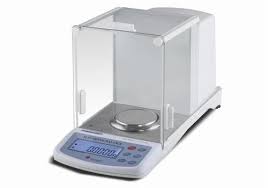
Analytical Balance with Internal Calibration in Noida

An analytical balance is a highly sensitive laboratory instrument designed to measure mass with precision typically to 0.1 mg (0.0001 g) or better. It is commonly used in chemical, pharmaceutical, and research laboratories where accurate weighing is critical. Calibration and performance checks are essential to ensure the accuracy of analytical balances, a critical aspect of pharmaceutical testing and quality control. Adhering to Good Weighing Practice (GWP) not only maintains precision and consistency but also ensures compliance with regulatory standards. Calibration is an integral part of balance qualification, establishing traceability of measurement results to SI units and providing a foundation for reliable data.
Conducted by the user or a competent body, calibration results, including measurement uncertainty, are documented in a calibration certificate. To maintain this traceability, it is crucial to perform calibration before any significant maintenance operation, such as repairs, relocation, or mechanical adjustments, which could alter the balance’s performance. This article explores how proper calibration and regular performance checks uphold the highest standards of accuracy and reliability in QC laboratory measurements, ensuring that the balance continues to deliver precise and dependable results even after significant operational changes.
- High Sensitivity: Measures small mass differences very precisely.
- Draft Shield: Enclosed in a glass case to prevent disturbances from air currents.
- Tare Function: Allows users to subtract the weight of containers.
- Digital Display: Provides easy-to-read mass readings.
- Calibration: May have internal or external calibration options to maintain accuracy.